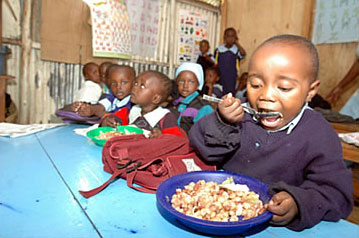Food keeps African children in school
Food keeps African children in school
 School feeding programmes help keep children in school and create markets for poor food farmers.
School feeding programmes help keep children in school and create markets for poor food farmers.A year ago, Fatouma would watch other children run to school while she stayed behind to care for her younger brothers and sisters. But a mere $34 per year helped the shy eight-year-old Senegalese girl take her place among students in the Tambacounda region in the eastern part of the country. Poor children are enrolling and staying in school, enticed by the daily meals they receive.
“When I wake up in the morning, I get ready to go to school very quickly because I know that good food is waiting for me,” says Fatouma. “I’m happy that I can spend the whole day at school learning and I don’t have to walk the long way home hungry. I like eating rice every day. In my family, we eat rice only two or three times a year.”
Jean-Noel Gentile, the deputy Senegal country director of the UN’s World Food Programme (WFP), says the daily meals given at the school motivate parents to enroll their children and encourage the students to remain there. The WFP funds most of the programmes, but parents pay CFA 300 francs, about US$0.60, per month for condiments and fish. Those who cannot afford to pay help to prepare the food or provide wood for cooking.
The New Partnership for Africa’s Development (NEPAD), a vision and strategic framework adopted by African leaders in 2001, refers to education as an important step in reviving prosperity on the continent. NEPAD officials are working with partners such as the WFP to get every child into primary school by 2015. Together, they also hope to expand access to secondary education and improve the relevance of school curricula to Africa’s development.
‘They become better students’
“Children like Fatouma are the future scientists and economists who will usher Africa to prosperity,” Mr. Gentile recently told Africa Renewal. “But on empty stomachs, they become easily distracted and have problems concentrating on their schoolwork. They become better students when their bodies are well nourished and healthy. The incentive of getting a meal also reduces absenteeism. Most significantly, performance improves and drop-out rates decrease.”
Without enough nutritious food, explains Ms. Gaby Duffy, the head of the WFP feeding programme in Senegal, Fatouma did not grow to be as healthy as other children her age. She looks five, instead of her eight years. When Fatouma started attending school, she was so weak from hunger that by the time she walked the 6 kilometres to school, she was too tired to learn.
Poor nutrition is a big problem in central and southeastern Senegal, where the WFP has the bulk of its school feeding programmes. The economy declined in the 1990s, leaving many with little to eat. Farming was weakened further by the arid conditions there. Most of the people there are subsistence farmers — struggling to grow enough corn, groundnuts, millet and beans to feed their families.
Encouraging farmers
NEPAD, with the WFP and other partners, is linking school feeding directly with agricultural development. The scheme, officially known as the Home-Grown School Feeding programme, insists on buying from local farmers the rice, beans, wheat, dairy and other ingredients used to prepare the food children are given in schools. It therefore reduces malnutrition while providing local farmers with the opportunity to sell their produce to participating schools.
This provides market incentives to farmers to grow more. They also save money as they do not have to travel far to markets. Previously, Ms. Duffy says, food was bought from outside because local farmers were often not able to grow enough high-quality crops. African leaders, under the NEPAD framework, are helping farmers to get better-quality seeds and tools to meet the continent’s food needs.
In addition to boosting student nutrition and providing farmers with a local market, the initiative is improving the economic welfare of local community members. Many now have jobs processing and cooking food for the students. They are hired, according to the WFP, to turn wheat into high-protein biscuits, cook meals and wash utensils. Also, students clean the food warehouse and utensils.
So far, nine countries — Ethiopia, Ghana, Kenya, Malawi, Mali, Mozambique, Nigeria, Senegal and Zambia — are participating in the first phase of the NEPAD initiative, which is designed to provide meals to about 674,000 students. The initiative also provides technical assistance to Ghana and Uganda. A team from Nigeria’s NEPAD office is developing plans for a Home-Grown School Feeding project in that country.
In Senegal, 115,000 students in the regions of Kaolack, Fatick and Tambacounda currently receive meals. The initiative also aims to reach an additional 120,000 students in 350 schools in the southern Casamance region.
‘Simple but concrete’
“Providing a meal at school is a simple but concrete way to give poor children a chance to learn and thrive,” Ms. Duffy emphasizes, noting that “in Fatouma’s case, teachers have noticed a dramatic improvement. She is regaining her weight and she can concentrate better during lessons. Every lunch break she eats, chatting away with her friends. She does not have to go hungry again.”
The benefits are also felt by poor households that are now relieved of having to scratch for food. When Fatouma gets home, she says, she no longer presses her mother for food.
“Now that my child has a good meal every day at school,” Fatouma’s mother said. “I don’t have to worry about leaving my work to prepare lunch and breakfast. I have more time for my own work and less worries about finding money and food for her breakfast and lunch.”
















